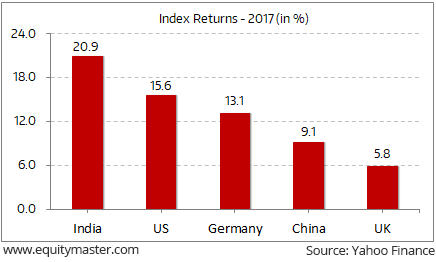Asian equities are higher today as Chinese and Hong Kong shares show gains. The Shanghai Composite is up 0.11% while the Hang Seng is up 0.39%. The Nikkei 225 is trading up by 1.19%. Wall Street's three major indices climbed to record closing highs on Friday with broad-based gains as a long-awaited bill to cut corporate tax rates looked like it would win enough support from lawmakers to pass.
Back home, Indian share markets have opened sharply lower with the Nifty slipping below its crucial 10,150 level after the early trends from the counting of votes in Gujarat and Himachal Pradesh started pouring in. The BSE Sensex is trading lower by 649 points while the NSE Nifty is trading lower by 206 points. The BSE Mid Cap Index and BSE Small Cap index both opened the day on a flat note.
All sectoral indices fell in the opening trade with metal stocks and realty stocks witnessing maximum selling pressure. The rupee is trading at 64.09 to the US$.
Pharma stocks opened the day on a mixed note with Aarti Drugs & Divi's Lab leading the losses. As per an article in a leading financial daily, Aurobindo Pharma Ltd. and Dr Reddy's Laboratories Ltd. are emerging as the frontrunners to buy out bankrupt Orchid Pharma Ltd. as they seek to expand their capacities.
One shall note that, a key player in injectibles and active pharmaceutical ingredients (API) in its heyday, Orchid has received interest from 7-8 companies including international private equity funds and stressed asset buyout firms.
Lakshmi Vilas Bank referred Chennai-based Orchid Pharma to the National Company Law Tribunal for defaulting on repayments to the tune of Rs 500 million.
Further, the company owes more than Rs 35 billion to a group of lenders led by the State Bank of India. It was on the Reserve Bank of India's second list of 28 defaulters that had to be referred to the NCLT before 31 December if no resolution was found by 13 December.
However, the assets of the company are good. Orchid Pharma has two API manufacturing facilities in India and three formulation manufacturing sites in India. These are all approved by the US Food & Drug Administration, the UK's Medicines and Healthcare Products Regulatory Agency and other regulators and agencies. All these demonstrate the potential of these plants, the reports noted.
Aurobindo Pharma share price & Dr. Reddy's share price opened down by 2% & 1.4% respectively.
Moving on to the news from the economy. Foreign investors are flocking to the Indian capital markets in a big way with a net inflow of more than US$ 30 billion (more than Rs 2 trillion), with equities alone getting over US$8 billion. This amount is bigger than the cumulative investment of the previous two years.
As the year draws to a close, the Indian stock market seems to have regained its status as one of the most favoured destinations for foreign portfolio investors (FPIs), as they have taken their net investment position in equities so far in 2017 to Rs 550 billion- the highest in three years after Rs 205 billion in 2016 and Rs 178 billion in 2015.
A sharper turnaround was seen in 2017 in terms of FPI inflows into debt markets where the net investments have soared to a staggering Rs 1.5 trillion, (US$ 23 billion) after a net outflow of about Rs 436 billion in 2016.
The higher inflow in 2017 compared to the previous two years could be attributed to expectation of a pickup in the domestic economic growth.
Besides, euphoric sentiment among corporates on account of improvement in 'ease of doing business' rankingcoupled with government showing commitment in speeding up development and economic reforms before going for elections in 2019 bode well for foreign investors' confidence.
This year's inflow has pushed FPIs' cumulative net investment in the Indian equity market, since being allowed over two decades ago in November 1992, to Rs 8.8 trillion.
The cumulative figure for debt securities has also grown to Rs 4.2 trillion - taking the total for both debt and equities to Rs 13 trillion (US$ 252 billion).
With regard to the debt market, FPIs started the year on a negative note, but infused money in February and their bullish stance has largely continued since then.
Interestingly, Sensex has been making new highs every day. Back in March 2016, we had predicted Sensex to touch 40,000 within a 3 to 4 year timeframe. At this pace, it seems like Sensex might get there sooner rather than later.
Interestingly, among all major indices, the Indian stock markets have given the best returns in 2017.
Global Index Returns in 2017

The current run seems to extrapolate all good news into the future and expects the ride to be smooth and consistent. But, history has shown that markets rarely work that way. While valuation has reached dizzy heights, investors are hoping that earnings will eventually catch up with valuations.
With money from retail investors coming into the market at a steady pace, the general assumption amongst investors is that growth will eventually come and justify the premium valuations they've given to the markets. Perhaps investors are getting ahead of themselves.
So, should you stay away from the market? Or swim with the tide?
Here's an excerpt of what Rahul Shah, Co-head of Research, wrote in one of the edition of The 5Minute WrapUp:
- "Indian retail investors should not blindly follow FPIs in and out of stocks. It is far better to take advantage of the volatility caused by their selling to enter good quality stocks for the long-term."
This article was originally published in English at www.equitymaster.com
Read the complete Indian stock market update. For the terms of use, go here.
No comments:
Post a Comment